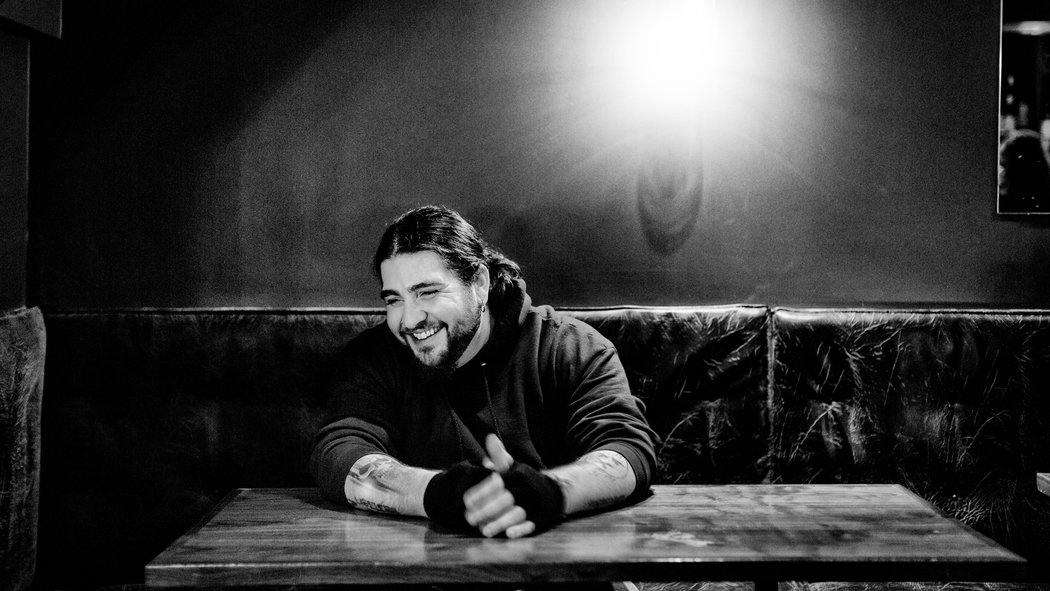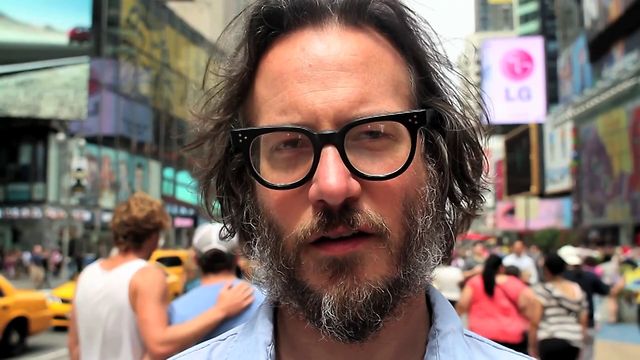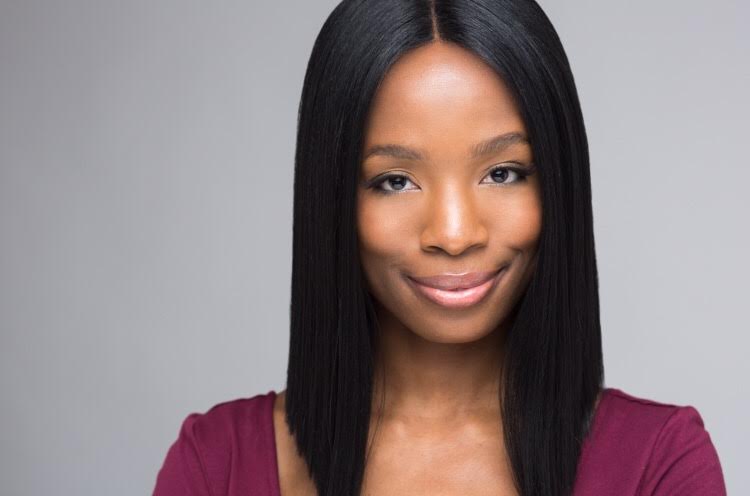What do they say about New York City: There are eight million stories, and sometimes it seems as though eight million of the people telling them think they’re comedians? No, that’s not it. It is a fact, though, that America’s biggest city is also its biggest comedy mecca. Hollywood may be Hollywood, but New York City is where comedians are born funny, become funny or arrive to thrust their funny upon us. I think we should meet some of these people. This is a recurring feature, a mini-profile of newcomers, up-and-comers and overcomers of New York’s vibrant comedy scene. It’s called Meet Me In New York.
Big Jay Oakerson won’t hold back. Like the late Patrice Oneal before him, Oakerson tells you what he means and means what he tells you, even if it burns some bridges in the process. But Oakerson is having quite a busy summer, nonetheless. He just inked a deal for his own Comedy Central special, saw his Legion of Skanks podcast picked up by Anthony Cumia’s new podcast network, and earned a SiriusXM radio show with fellow comedian Dan Soder. All of that follows the release last year of his first Comedy Central Record, “The Crowd Work Sessions: What’s Your F@!?#ng Deal?!”
Tonight, his funny friends likely will have much fun at Oakerson’s expense (not to mention his newly cut-short hair!) at the Roast of Big Jay Oakerson at The Creek and The Cave in Long Island City.
Let’s catch up with the rest of Big Jay’s journey to the Big Apple. (For a modest contribution to my podcast via Patreon, you can hear Big Jay narrate his Meet Me In New York story in your ear holes!)
Name: Jay Oakerson
Arrival Date: November/December 2001
Arrived From: Philadelphia
When and where did you start performing comedy? Two years earlier. At the Laff House in South Philly, South Street. It was a all-black comedy club, and I went in there, just, you know, shitty Jerry Springer jokes, something just awful. It went well. Went very well. And then it didn’t go well for a long time after that. But the first time it went very very well. I was so happy. Which is very good. It’s spiritual – it’s a very interesting thing, how I’m like a born quitter. So anything that seems difficult at all. So if I had gone onstage that first time and bombed, I would have literally never tried again. I would have been like, ‘Yeah, that’s what happens when you do that, and I don’t want to feel that ever again.’ So I just did really well that first time, and even though weeks and months going forward didn’t do really well again, you’re still like, it did go well that first time. It was awesome. I remember – it’s so funny – I remember leaving the stage and in my mind, it just felt like slow-motion, Rudy moment, everyone’s cheering for me. They probably just clapped and were like, decent job. But to me, the fact that it didn’t bomb was just so huge. Start chasing that again.
What was your best credit before moving here?
BET’s Comic View. That was it! And then I did it a second time in my first few months of living in New York. BET’s Comic View I’ve done thrice in total. But that was what I had my first time that I went. A first set of comedy so driven towards a young, black hip-hop audience. It was so weirdly a million miles away from what I do now. You can still see if you watch old tapes of mine, my sense of humor is my sense of humor. But you could see, I think I can adapt to any situation, but what you see is me forcing jokes about P. Diddy, or you know, superheroes in the hood. You know what I mean? Those aren’t concepts I can’t make funny or do in my own way, but forcing it, I knew the bullet points and the words I could say to get people to laugh really hard in a black room.
Why did you pick NYC over LA or anywhere else?
“I had been doing comedy maybe two years. I think it was November or December of 2001, I believe, because I used to drive – me, Kevin Hart and Keith Robinson used to drive up from Philly every day to come to the city. Kev at that point, I think, had already gone – I think he moved to L.A. really quick. And me and Keith were doing it, and sometimes I’d even do it by myself. And I started dating a girl, who became my wife, who became my ex-wife. Subsequently. But I was dating her, and I would drive myself up a lot, because I was going to be a little later meeting up with everybody. And that drive from Philly, that was like generally two hours going, an hour and a half to two hours going home, now became five hours driving up, three hours going home. Because they’d shut the city down. One entrance in, through one tunnel only. It was just the Holland Tunnel, the only way in and out. One lane. They were pulling everything that was not a regular car over to check the back. It was right after 9/11. I was like, that commute’s killing me. I’d either have to stop doing comedy in New York, or I’d just have to go. My chick had extra money from student loans for law school – me, her, and Kurt Metzger and his girlfriend, Jessica Delfino, who also does comedy now (she wasn’t at the time). We said fuck it, got a place in Astoria, Queens, and that was it.”
So why did you choose NYC and not L.A. like Kevin Hart did?
“Kev, he went to Montreal right out of the gates, and got that development deal. He got cast in a Judd Apatow pilot that didn’t go anywhere. Very quickly, my point being: They were throwing him into acting stuff. I had no idea that I would be involved in anything acting. That was no reason why I started doing this. So that’s why New York to me, I romanticized the idea. I still do. Love it. That you can get to a point where you can survive off of just like – every night I go out, I’m a staple in the city to some degree. You know where I’m at – I’m at the Comedy Cellar, The Stand or wherever every weeknight and weekends when I’m home. You know what I mean? I think that’s cool. I know the staffs everywhere. That’s a neat thing, to be a part of something like that in the greatest city in the world.”
How long did it take you to get your first paid gig in NYC after moving here?
“Ah. So long. I wish I had a clock on that to know when it went from like – I’ve talked to Kurt Metzger about this before – I don’t know when we went from ‘Jeepers creepers, can we get onstage?’ to young comic, being ‘Can I hang out with you? And tell me stuff?’ Know what I mean. Like I don’t know when that happened. I also don’t know how I went from 19 years old and trying comedy to being 37. I don’t know where it goes. Probably just…not to be the sad sack. But it’s quite the journey. It’s fucking crazy. So I’d say a couple of years to make any mainstream money. What I did have early on, was doing those black shows and black rooms kept me in that circuit. So in that circuit, very young in comedy, I was able to get, we’ll give you $700 to go – I’d be getting ripped off, by the way, because there’s a lot more money in it than that – but go do a ski trip show. Drive up and do a show. That was insane money at the time. Certain shows, if you’d go do it, you’d get $300.”
That’s got to be tempting to young comedians, especially compared to bringer shows.
“The other thing, too, I don’t know if it worked in my favor or not, but not being from there, and being so young in comedy – the bringer shows thing I couldn’t do. I didn’t know anybody. There was nobody to bring. To get five people to come into Manhattan? I didn’t know anybody. So I didn’t get to do those shows. But again, being introduced by Keith Robinson to the scene, with Kev and Kurt the way we were? Very quickly I was, we became great friends, me and a lot of these guys, but at the very least, I was comfortable – I don’t know if I’d call them friends – but with Patrice, and Rich Vos, and not so much Attell, but Robert Kelly I knew well. Bill Burr, the younger phase of his career. I got to be in the mix with those guys. Not performing with them. But I’d go on the road and open for Bill at colleges, the audience that was where was the audience on campus that would go to a comedy show, not a Bill Burr fan. And Patrice took me on the road. Bobby Kelly, too. Those guys were huge to me. Keith bringing us up and then Dave Attell bringing me on the road – that was the grad school.”
“Their endorsements is what got me working in clubs.”
How is this scene better/same/worse than the scene you moved from?
“I don’t know the Philly scene now. I know Laff House closed and there’s Helium Comedy Club now….the scene is now I believe, I don’t know what the urban/black scene is like there now, but I follow comics on Facebook and some of the names of the shows down there are hilarious. The names of the hipster shows are all hilarious, too. I think it’s much more, it’s back to being – before my time – it’s back to being at least the Helium club. Mainstream comedy, there’s a place for it to come out of. Me and Kurt Metzger, Joe DeRosa, Mike Vecchione, we all are in our very early formative years were in the Laff House performing for aggressive black audiences who wanted a certain kind of comedy. There were comedy cabarets which were makeshift shit rooms that they put in the back of Best Western lobbies and hotel lobbies and Bennigan’s and Houlihan’s restaurants, those kind of things. There was a place called Doc Watson’s. Bar shows essentially, scenes were you could get an audience of black, white, that’s what a mainstream audience is – not black or white but a mix of everybody – whereas the Laff House was a black audience. It was promoted on the hip-hop station. Very cheap to get in. Drink specials. It was a Thursday night thing. Such an event. But I loved it. I look back on it, I wish I was – I know I’m a better comic for it, but I wish I was a better comic in it. Because it’s fun to go do, I’ll still do a show with those guys. ‘Hey, I’ve got a room in so-and-so, you want to come do it?’ Sure! Does it have a stage and a microphone? I’m not doing it in some shitty situation – there’s an audience, right? Yeah, I’ll go do it. Because they never know what to make of me at first. I don’t pander anymore. That’s not what my set’s like anymore. I’m 17 years confident to walk in there and be like, they’ll get it in a minute. They won’t get me right now, but I’ll get ‘em.”
Can you describe an “only in New York City” moment from your experience here?
“The first time I got on the subway, I didn’t want to go on the subway ever. This is where people get robbed. I see it in movies. I really expected it to be spray-painted and shit. I went on, and I remember sitting there, and it’s not too bad. Then the homeless guy starts giving a speech and walking around and being weird. Then next stop, literally, guys walk in and start doing flips and dancing in these tight quarters. And a hippie kid started singer, ‘And I Love Her,’ on acoustic guitar. And then like, without exaggeration, this isn’t even in Manhattan yet – this is the last stop before going into Manhattan, which I believe was where I was getting off the first stop at Lexington Avenue – a mariachi band jumped on and started playing! This was all done for me?! That was such a New York experience, because I take the subway excessively now, and not that those things don’t happen now, but I can’t tell you the last time the doors opened and a mariachi band. If you told me, did you know there’s a mariachi band on the other side of the train? I’d be like, I guess. Sure. That is, only in New York will you get that desensitized to the insanity, the screaming, that kind of noise. The intensity of that. No suburban essence to it whatsoever.”
What tip would you give to any comedian who moves here?
“Do it quick. I think people that wait too long in their hometown. That’s why I gave advice to two guys in Philly, Joe DeRosa, Mike are two of the guys that I really pulled up. I really took an interest in taking these guys around and being, look at these guys. Do the best that I could do. My status wasn’t too much, but I could do…anything I could do. Because that’s what Keith Robinson did for me. He met me at a time when I was just thinking maybe I’d go back to college. Driving to New York and doing those black shows, sometimes they wouldn’t pay me, because fuck you, what are you going to do about it? That sucked.”
“It’s the best gym. So give yourself two years. Wherever you’re from, to get that, I go onstage and I’m not wigged out by the concept of being onstage, and then why not go work out in the best gym? Because there’s people your level there already? So get to New York quick. Two years or slightly over.”
Where do you see yourself five years from now?
“Man, I hope just fucking being able to do what I like to do and making significantly more money at it. There’s no other way to say it. I don’t have a passion for movies or – maybe those things are possible, but if I get to just talk into the microphone, it’ll be stand-up for sure, or radio, whatever it comes down to. And I make money that, when I need clothes I get clothes, when I need to see the doctor I go to the doctor, things like I have insurance. I’m fine, man. I don’t need a lot of space. I like my toys. My video games. My big TVs. Comfortable furniture. Man, I’m pretty set. I’d love to live in a nice building, but I don’t have like Lamborghini dreams and beach house in Malibu shit. I don’t care about any of that. I don’t get stopped in the street that much. I love fan attention. But I don’t mind if I’m never Times Square billboards. If I have people that love what I do and they can come and fill comedy clubs to see me do it, and I get paid well to do it, that’s, I think in five years that’s possible.”
Buy his CD:
Here’s a short clip of him in his short hair from this summer’s Bonnaroo festival in Tennessee:
He has told several stories on “This Is Not Happening,” the Comedy Central storytelling series. This is about seeing two women fight outside a comedy club:
You can see me interviewing Oakerson five years ago at the old Comix club.
Which NYC comedian would you like to see me style and profile next for Meet Me In New York? Send your nominations to: thecomicscomic AT gmail DOT com



